Hello, everyone.
It seems we’re getting really close to release... So, rather than focusing on a specific mechanic, today we will cover some of the new flavor that has been added with the next update.
Pregnancy Flavor
First of all, let us talk about pregnancy. The free patch coming with Holy Fury will change a few things about how women can incur in complications during pregnancies. Rather than having a random chance to die in childbirth without any warning, female rulers will have access to a more interactive event chain, offering a more natural escalation, as well as various options to facilitate their labor if things are taking a turn for the worse.

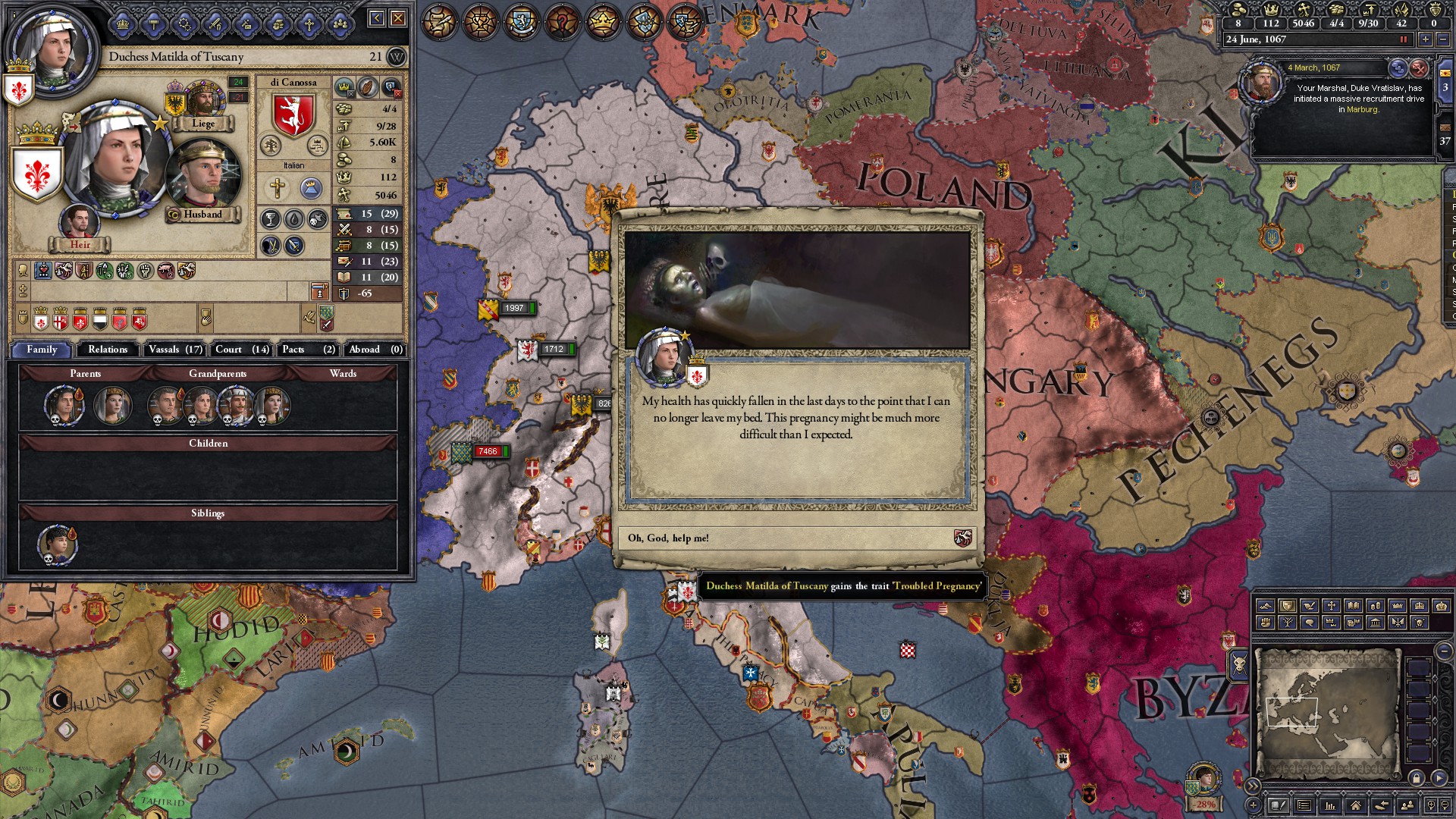
Additionally, several flavor events regarding pregnancy in general have been added to the game, allowing players to have a greater control over the circumstances and conditions of their children’s birth, as well as providing new roleplaying opportunities for your ruler’s spouse and relatives.

Seclusion, festivals, vows to the Holy Virgin and much more are included in this large new package of flavor, yet most of these events can be toned down or disabled entirely through a new game rule, if you so desire.
Child Baptism

Additionally, Christian Kings and Emperors will now have access to a new decision when giving birth to a new little heir: that is, to organize a special baptism for their child, allowing a powerful Prince-Bishop in their realm to officiate the ceremony, or, if they are willing to pay the price for it, their religious head itself.
Receiving a special baptism will give your child an increase in monthly Piety and a considerable opinion boost towards the priest picked for the ceremony as well as the godfather that you assigned to him from a small selection of vassals and relatives.
Of course, if you belong to a certain secret society, you might prefer to give your child an entirely different type of baptism...

Great Tribal Pillars and Tribal Festivals
Let us say that you are trying to Reform your Pagan religion, but wish to take a more peaceful approach to increase the Moral Authority of your religion, one that does not require you to repeatedly loot those poor Catholic churches...
Well, Holy Fury offers you two new options to do so.

A Great Tribal Pillar is a special building that you can create by targeted decision in your capital, provided that you are an independent unreformed tribal pagan ruler of Duke-tier or above. The Great Pillar will increase your religion’s Moral Authority and provide some special bonuses to your capital province based on the religion you belong to.
Since a Great Pillar can only be created if no other such construction exists within your realm and only by an independent ruler, it might incentivize to keep a number of independent pagan realms around (or to de-vassalize them), so that the construction of more Pillars will result in an overall higher Moral Authority.
Be careful though, because enemy troops that siege or raid a province hosting a Great Pillar will be able to destroy it, if they so choose. If this happens, not only will you lose Moral Authority, but all the pagans in your realm will receive a temporary malus on troop morale.
Additionally, if an infidel ruler conquers a province that holds a Great Pillar, he will be able to simply burn it down by decision.
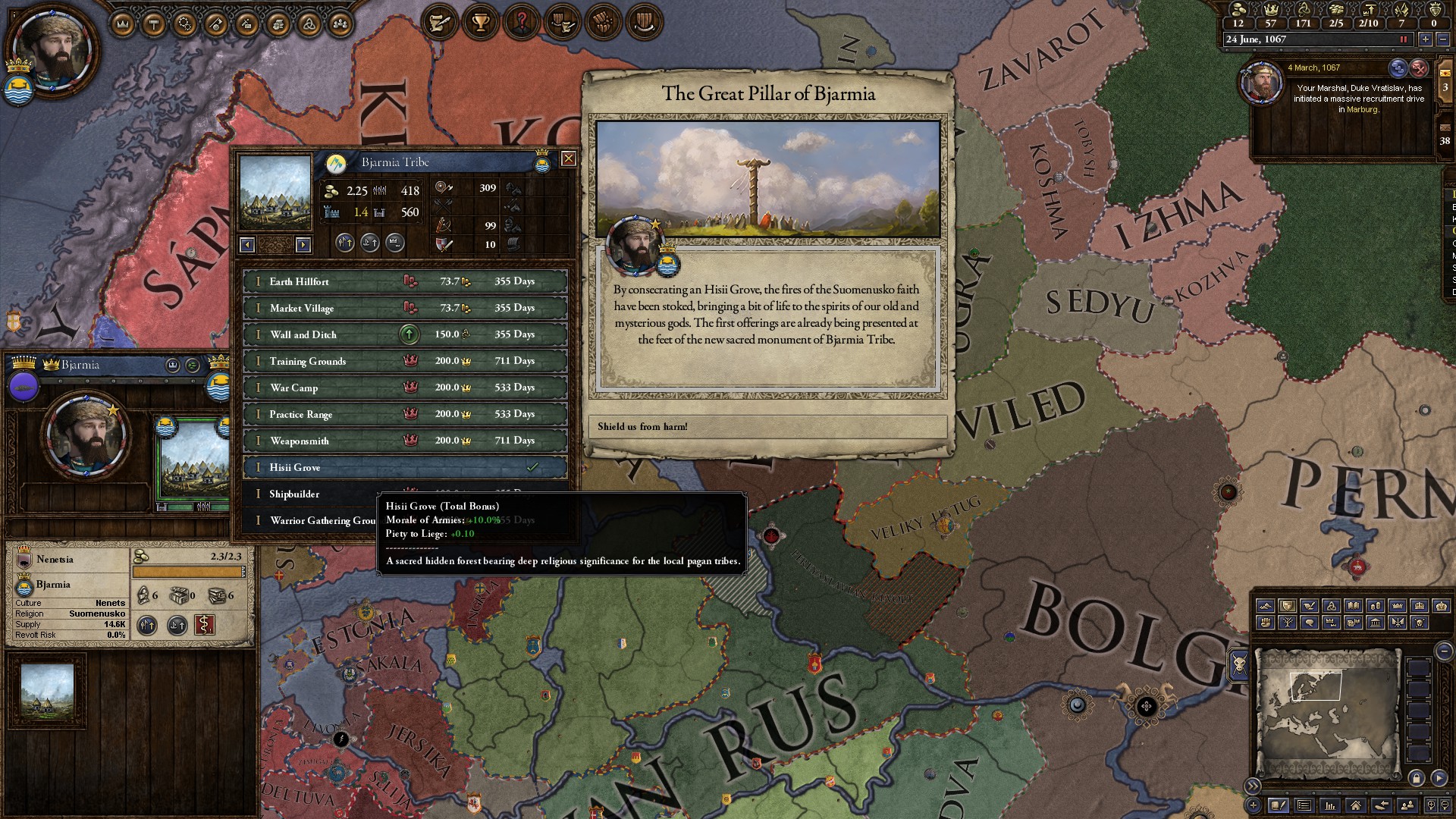
Irminsul has been turned into a special Great Tribal Pillar, available on the Charlemagne start, that can be destroyed during the Saxon War event chain.
Additionally, Great Tribal Festivals are a special feast event available to any independent Tribal ruler of Duke-tier or above (Pagan or otherwise). They yield some unique flavor of their own, including various competitions amongst the guests, events for children and Warrior Lodge members. At the end of the festival, if the ruler is unreformed Pagan, the final ceremony event will give a temporary Moral Authority boost, otherwise it will result in a scaled Piety gain.
Doctrine Flavor
Finally, while the mechanics around Pagan Reformation have already been thoroughly explained in a previous Dev Diary, we thought it might be best to take some time and go in greater detail to explain some of the more peculiar and event-heavy Doctrines that are being added with Holy Fury.
Astrology

As already revealed in the previous Dev Diary, this Doctrine allows access to the Hermetics. Additionally, once this Doctrine has been adopted, characters will be born with their appropriate Zodiac sign, depending on their birthdate. Each Zodiac trait grants different boosts and debuffs and people of certain signs will have higher or lower opinion of people of other signs, depending on their compatibility.
Finally, when Astrology is mixed with Haruspicy, your religious head (or Chaplain if missing), will occasionally read the future in the stars, providing a positive or negative response to all the rulers of the faith that will result in different province modifiers.
Haruspicy
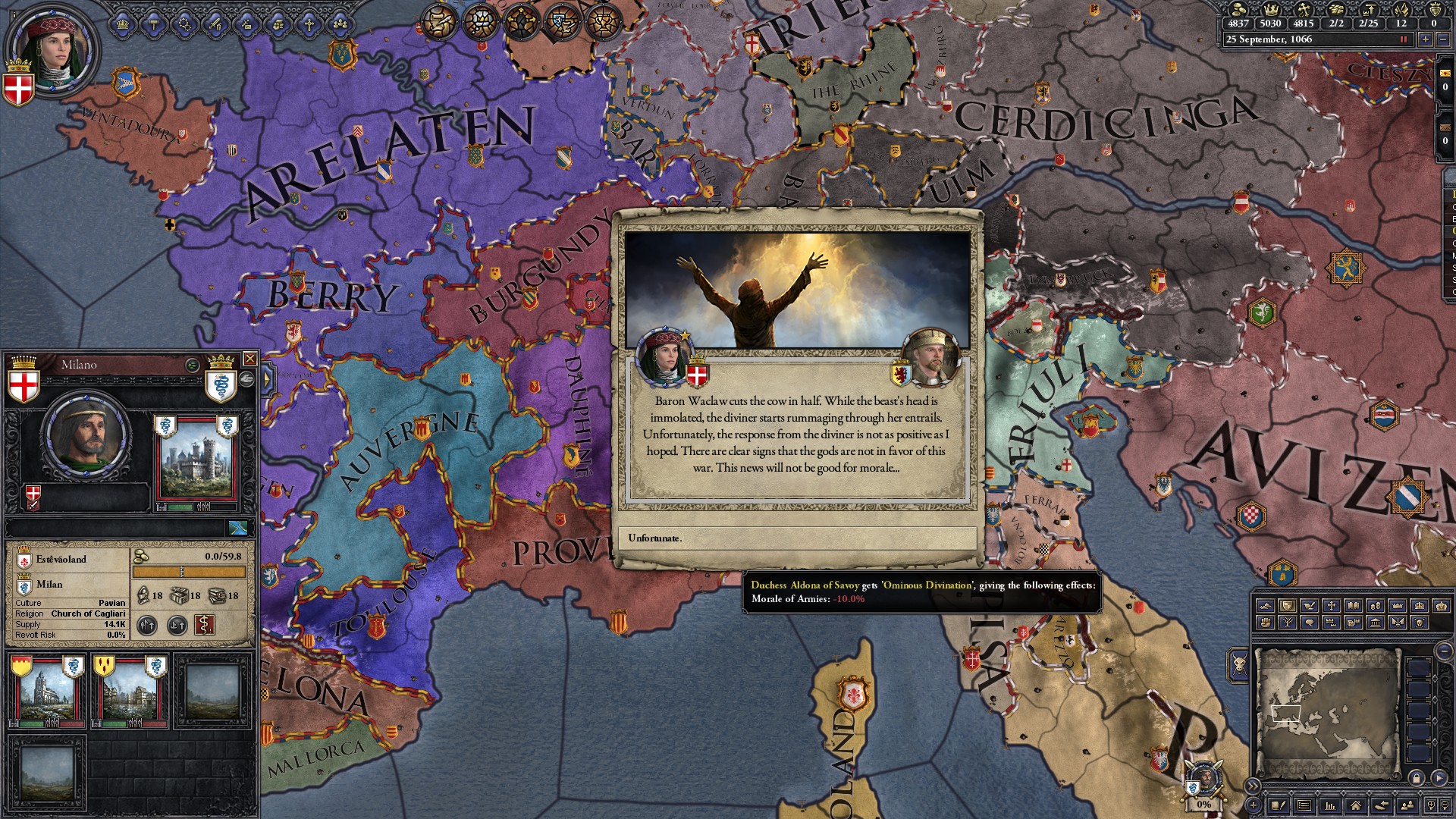
Whenever engaging in a war, rulers with the Haruspicy Doctrine will be able to sacrifice an animal to divine the future before going to battle.
Making a larger (and more expensive) offering, as well as being pious and having a high learning Chaplain will increase the chances of the divination yielding a positive response. Once the divination has been completed, your ruler will receive a permanent boost or malus to troop morale that will remain active until wartime is over.
Bloodthirsty Gods
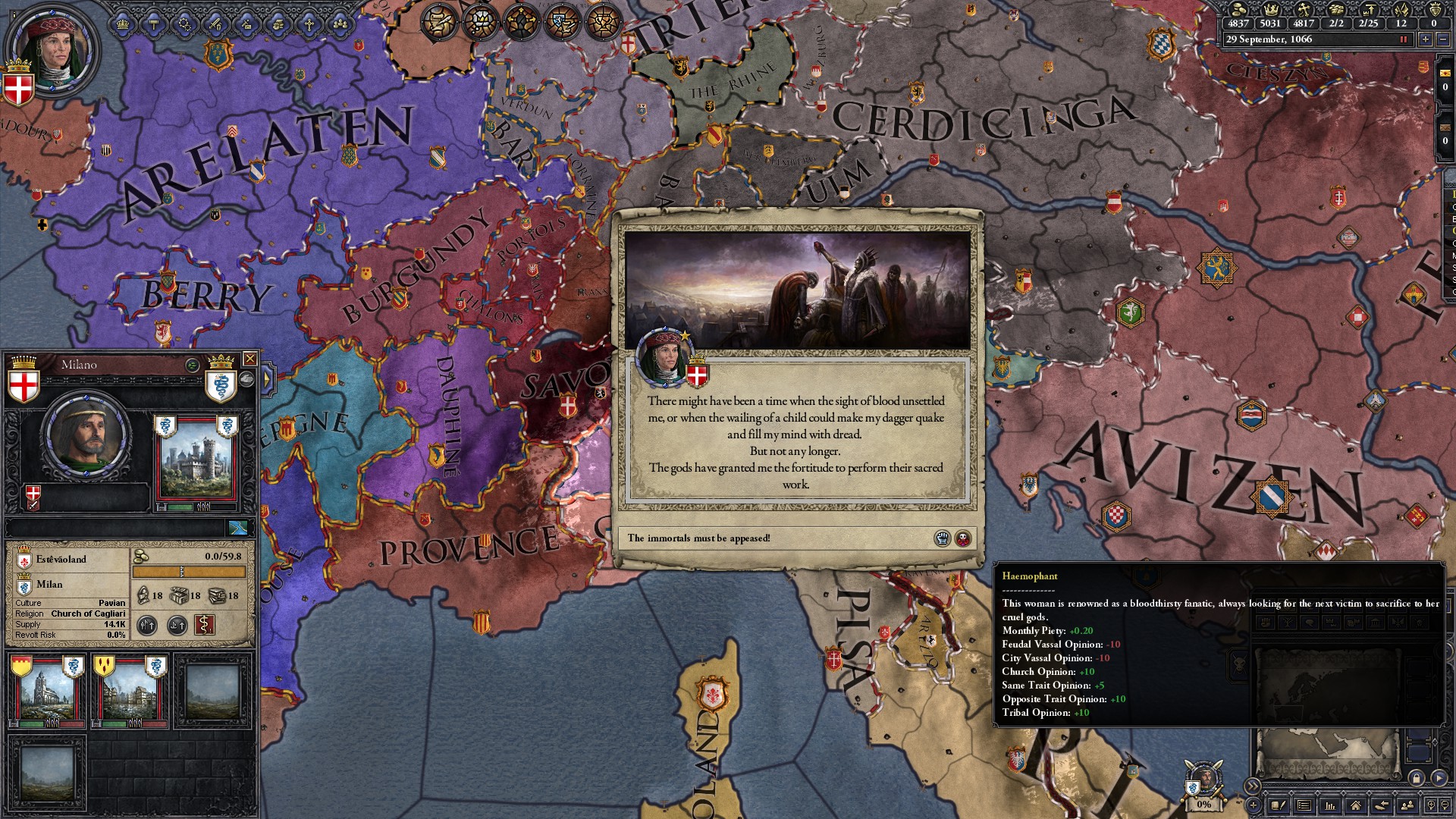
Rulers of this Doctrine can sacrifice captured infidels to gain Piety. Additionally, sacrificing enough people to the gods will result in your ruler unlocking special traits and actions. Much like a raiding Norse can eventually become a Viking and work his way to the Sea-King status, a devoted bloodthirsty ruler can attempt to become Haemophiliac and work his way to the title of Haemoarch. Becoming Haemophiliac will unlock the Blood Tournament decision, a feast event during which ruler and vassals can pick one of their prisoners or commanders to fight to the death, until only a champion survives. Becoming Haemophant will unlock the Mass Sacrifice decision, which allows a ruler to immolate part of his own population (gaining bad province modifiers) in order to temporarily increase the morale of his armies. Finally, an Haemoarch ruler gains access to the Flower War casus belli, allowing him to gain piety and cripple the target realm’s provinces upon victory. And if you want to go even beyond that, there might be a special Bloodline waiting for you...
Piracy
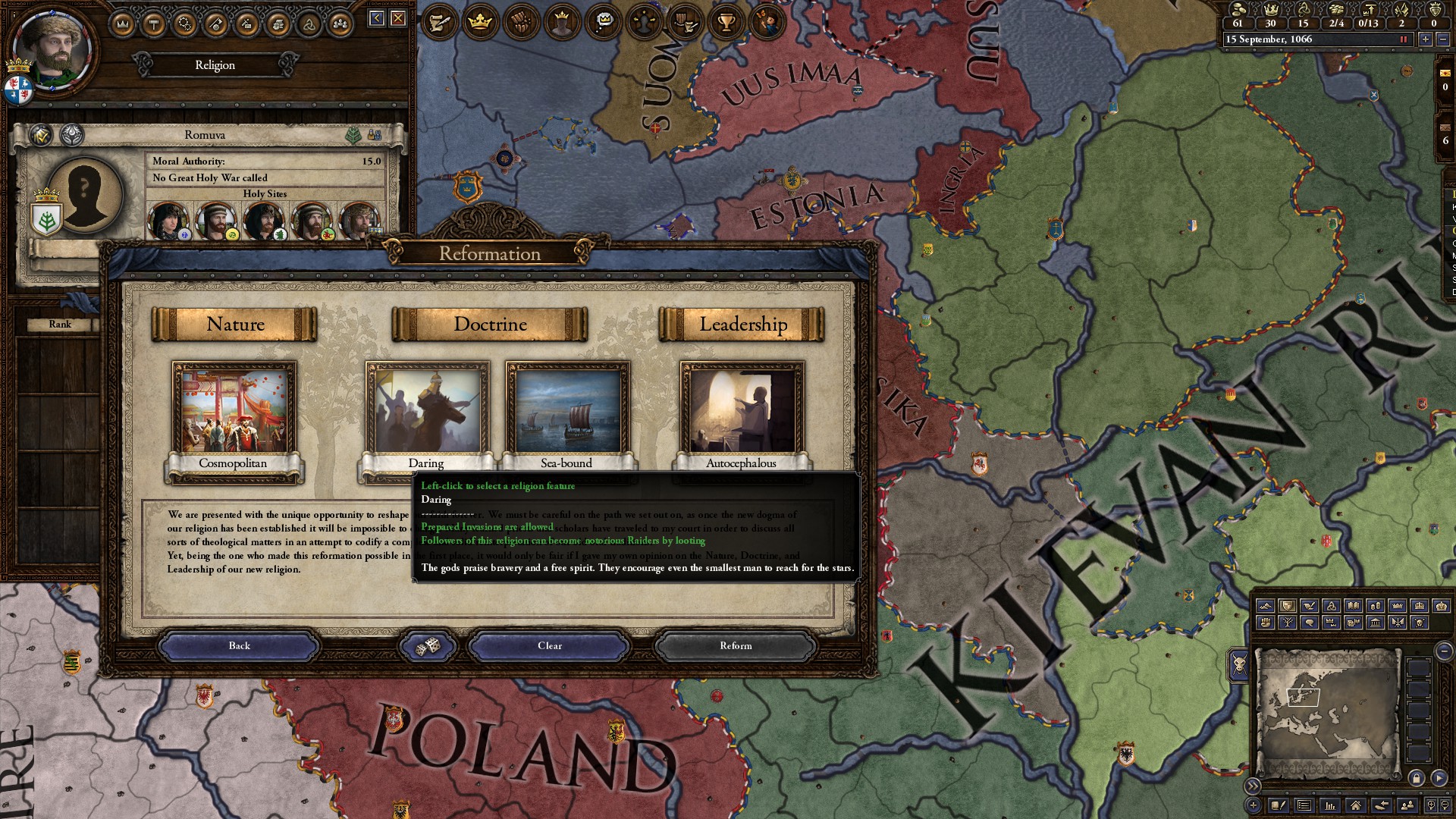
Not a Doctrine per se, but a special synergy obtainable when mixing Seafaring and Daring together, it will allow to characters of your religion to gain the Pirate/Ravager/Sea-King traits when raiding, much like the Norse do. Additionally, both Vikings and Pirates have been given several new raiding-based events to make your exploits across the seas a bit more entertaining, as well as a special Bloodline to unlock if you are a particularly dedicated pillager.
It seems we’re getting really close to release... So, rather than focusing on a specific mechanic, today we will cover some of the new flavor that has been added with the next update.
Pregnancy Flavor
First of all, let us talk about pregnancy. The free patch coming with Holy Fury will change a few things about how women can incur in complications during pregnancies. Rather than having a random chance to die in childbirth without any warning, female rulers will have access to a more interactive event chain, offering a more natural escalation, as well as various options to facilitate their labor if things are taking a turn for the worse.


Additionally, several flavor events regarding pregnancy in general have been added to the game, allowing players to have a greater control over the circumstances and conditions of their children’s birth, as well as providing new roleplaying opportunities for your ruler’s spouse and relatives.

Seclusion, festivals, vows to the Holy Virgin and much more are included in this large new package of flavor, yet most of these events can be toned down or disabled entirely through a new game rule, if you so desire.
Child Baptism

Additionally, Christian Kings and Emperors will now have access to a new decision when giving birth to a new little heir: that is, to organize a special baptism for their child, allowing a powerful Prince-Bishop in their realm to officiate the ceremony, or, if they are willing to pay the price for it, their religious head itself.
Receiving a special baptism will give your child an increase in monthly Piety and a considerable opinion boost towards the priest picked for the ceremony as well as the godfather that you assigned to him from a small selection of vassals and relatives.
Of course, if you belong to a certain secret society, you might prefer to give your child an entirely different type of baptism...

Great Tribal Pillars and Tribal Festivals
Let us say that you are trying to Reform your Pagan religion, but wish to take a more peaceful approach to increase the Moral Authority of your religion, one that does not require you to repeatedly loot those poor Catholic churches...
Well, Holy Fury offers you two new options to do so.

A Great Tribal Pillar is a special building that you can create by targeted decision in your capital, provided that you are an independent unreformed tribal pagan ruler of Duke-tier or above. The Great Pillar will increase your religion’s Moral Authority and provide some special bonuses to your capital province based on the religion you belong to.
Since a Great Pillar can only be created if no other such construction exists within your realm and only by an independent ruler, it might incentivize to keep a number of independent pagan realms around (or to de-vassalize them), so that the construction of more Pillars will result in an overall higher Moral Authority.
Be careful though, because enemy troops that siege or raid a province hosting a Great Pillar will be able to destroy it, if they so choose. If this happens, not only will you lose Moral Authority, but all the pagans in your realm will receive a temporary malus on troop morale.
Additionally, if an infidel ruler conquers a province that holds a Great Pillar, he will be able to simply burn it down by decision.

Irminsul has been turned into a special Great Tribal Pillar, available on the Charlemagne start, that can be destroyed during the Saxon War event chain.
Additionally, Great Tribal Festivals are a special feast event available to any independent Tribal ruler of Duke-tier or above (Pagan or otherwise). They yield some unique flavor of their own, including various competitions amongst the guests, events for children and Warrior Lodge members. At the end of the festival, if the ruler is unreformed Pagan, the final ceremony event will give a temporary Moral Authority boost, otherwise it will result in a scaled Piety gain.
Doctrine Flavor
Finally, while the mechanics around Pagan Reformation have already been thoroughly explained in a previous Dev Diary, we thought it might be best to take some time and go in greater detail to explain some of the more peculiar and event-heavy Doctrines that are being added with Holy Fury.
Astrology

As already revealed in the previous Dev Diary, this Doctrine allows access to the Hermetics. Additionally, once this Doctrine has been adopted, characters will be born with their appropriate Zodiac sign, depending on their birthdate. Each Zodiac trait grants different boosts and debuffs and people of certain signs will have higher or lower opinion of people of other signs, depending on their compatibility.
Finally, when Astrology is mixed with Haruspicy, your religious head (or Chaplain if missing), will occasionally read the future in the stars, providing a positive or negative response to all the rulers of the faith that will result in different province modifiers.
Haruspicy

Whenever engaging in a war, rulers with the Haruspicy Doctrine will be able to sacrifice an animal to divine the future before going to battle.
Making a larger (and more expensive) offering, as well as being pious and having a high learning Chaplain will increase the chances of the divination yielding a positive response. Once the divination has been completed, your ruler will receive a permanent boost or malus to troop morale that will remain active until wartime is over.
Bloodthirsty Gods

Rulers of this Doctrine can sacrifice captured infidels to gain Piety. Additionally, sacrificing enough people to the gods will result in your ruler unlocking special traits and actions. Much like a raiding Norse can eventually become a Viking and work his way to the Sea-King status, a devoted bloodthirsty ruler can attempt to become Haemophiliac and work his way to the title of Haemoarch. Becoming Haemophiliac will unlock the Blood Tournament decision, a feast event during which ruler and vassals can pick one of their prisoners or commanders to fight to the death, until only a champion survives. Becoming Haemophant will unlock the Mass Sacrifice decision, which allows a ruler to immolate part of his own population (gaining bad province modifiers) in order to temporarily increase the morale of his armies. Finally, an Haemoarch ruler gains access to the Flower War casus belli, allowing him to gain piety and cripple the target realm’s provinces upon victory. And if you want to go even beyond that, there might be a special Bloodline waiting for you...
Piracy

Not a Doctrine per se, but a special synergy obtainable when mixing Seafaring and Daring together, it will allow to characters of your religion to gain the Pirate/Ravager/Sea-King traits when raiding, much like the Norse do. Additionally, both Vikings and Pirates have been given several new raiding-based events to make your exploits across the seas a bit more entertaining, as well as a special Bloodline to unlock if you are a particularly dedicated pillager.

